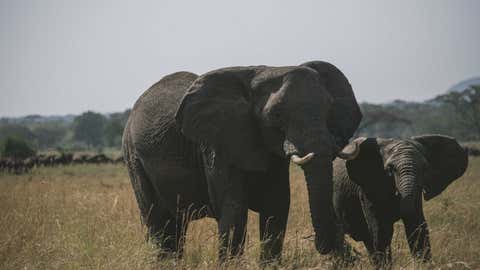
Elephants
(IANS)Just like humans, even elephants are prone to acute and chronic stress, which can be associated with habitat loss, conflicts, death in the family, weather extremes or injuries. Now, in a first-of-kind study, a team of researchers have tried to assess the long-term physiological health of the majestic Asian elephants using an unlikely part of their body: the tail hair.
Explaining the motivation behind the study, the lead author Dr Sanjeeta Sharma Pokharel from Indian Institute of Science, Bengaluru told The Weather Channel: “Long-term monitoring of health and welfare of large-bodied and long-living animals, like elephants, either in captivity or in wild, is one of the major concerns amongst conservation biologists.”
Studying stress hormone in Elephants
Over the years, conservation biologists have used several scientific methods to quantify the physiological health of animals, including the use of biomarkers like hormones and steroids. Such biomarkers can be measured using blood, urine, faeces, feathers, scales, and many other biological samples.
The current study particularly analysed the stress hormone with the help of an elephant’s tail hair. Hair has been used to assess stress levels in different animals like polar bears and Siberian flying squirrels in the past. But for elephants, this is a first.

Elephants
(IANS)“It has been widely used in the case of primates and other few mammals to study their physiological states in relation to various stressors and conditions. However, such a technique of measuring physiological markers from hair has never been used in elephants,” explains Dr Pokharel, highlighting the uniqueness in their approach.
The study examined cortisol hormone in the elephant tail hair as a biomarker for past stressful conditions researchers specifically compared and evaluated the previous stress status of captive Asian elephants. Moreover, the team also accessed and compared the daily records maintained by the keepers on behavioural and health status of these elephants with the stress recorded in hair.
The study was performed in zoo elephants from Kyoto City Zoo and Kobe Oji Zoo. Among the subjects, there were five females (two adult, one subadult and one juvenile) and one juvenile male.
Physiological past of elephants
Using this technique of measuring hair cortisol, the researchers were able to trace back the physiological pasts of elephants. As per the study, the immunoreactive cortisol in the hair (hC) has been used widely for deciphering ‘stressful’ past-events in various wild and captive animals. Therefore, the tail hair of elephants is classified as a repository of chemical information.
“Interestingly, when we compared the obtained hormone levels with the zoo records (post-analysis), we found that some of the high and low levels were associated with different biological events that occurred in elephants in the past. This provided us with pieces of evidence that the hair-cortisol in elephants can be measured and can be used as the retrospective calendar for elephants' physiological past,” concludes Dr Kinoshita Kodzue, the corresponding author of this study. The study was conducted in Kyoto University, Japan.
The study was published in the journal PeerJ and can be accessed here.
"captivity" - Google News
February 03, 2021 at 07:47PM
https://ift.tt/39H3671
Tail Hair Turn Stress Gauge for Researchers to Decipher Past Long-term Health of Elephants | The Weather Channel - Articles from The Weather Channel | weather.com - The Weather Channel
"captivity" - Google News
https://ift.tt/3b01anN
https://ift.tt/3dbExxU
Bagikan Berita Ini














0 Response to "Tail Hair Turn Stress Gauge for Researchers to Decipher Past Long-term Health of Elephants | The Weather Channel - Articles from The Weather Channel | weather.com - The Weather Channel"
Post a Comment